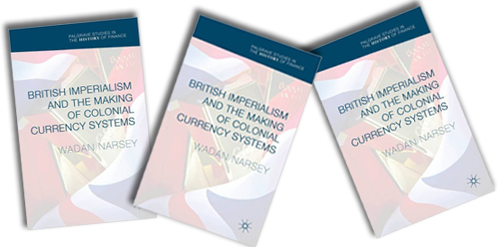IDS Alumnus Wadan Narsey, blogs about publishing his thesis, and his active involvement during the 30 years prior working locally in Fiji on development issues. British Imperialism and the Making of Colonial Currency Systems, is being published by Palgrave Macmillan in March 2016.
British Imperialism and the Making of Colonial Currency Systems is based on my IDS DPhil that I started in 1981. I chose to come to IDS partly due to my close friend then, John Samy being an IDS graduate who had also facilitated the 1984 involvement of IDS (Dr Manfred Bienefield and Professor Dudley Seers) in Fiji government employment policies.
My DPhil was supervised by Charles Harvey and David Evans, and originally intended to focus on Fiji’s money and banking system. However, the research clandestinely widened into the historical evolution of British colonial currency systems in general, with chapters on Africa, Singapore, India and the London Money Market.
Macmillan had agreed in 1990 to publish the book, but I let the opportunity go begging because of pressing ‘local issues’.
Local development taking precedence
As is the case for many who study at IDS because of its radical activist approach to international development problems, after completing my DPhil, I gave precedence to active involvement in Fiji’s development problems, made worse by multiple military coups.
Returning to my economics teaching at The University of the South Pacific (USP) where I had been working since 1973, I became part of the 1980s radical movement that began the Fiji Labor Party, which gained power in 1987 only to be deposed by the Rabuka military coup.
Interspersed with my teaching were several years as Director of Planning and Development at USP.
But far more important in shaping my teaching and research were the several years in the Fiji Parliament as Shadow Finance Minister, when peaceful co-operation with the 1987 coup leader, Rabuka, saw the country return to constitutional government. Sadly, voters at the 1999 election rejected all the moderate parties and candidates, myself included, so I returned to university teaching.
Then followed further political instability with the 2000 military coup and bloody army mutiny against Bainimarama and its suppression. About which, the truth has yet to be written, while its after-effects are still felt today.
The 2006 Bainimarama coup and beyond
Then came the stage-managed 2006 coup by Bainimarama who deposed a multi-party government led by indigenous Fijian leader Qarase, but also including the Indo-Fijian dominated Fiji Labor Party, while an Australian Commissioner of Police fled for his life.
The alleged justification for the coup was to ‘clean up corruption’ but beneath the surface were imminent police charges resulting from brutal multiple murders following the 2000 army mutiny, and sedition charges for a commander who refused to be removed by the lawful government.
A large part of my work for the last ten years, has been in opposing and exposing the Bainimarama 2006 coup and military dictatorship which has been assisted by opportunistic civilians and large corporate giants. Bainimarama has slowly, consolidating power, gutted the judiciary, militarised the civil service and statutory enterprises, and tightened media censorship.
Bainimarama’s coup justification slowly changed to ensuring ‘equality for all Fijians’ and protection of minorities, a message which resonated with an undiscerning international community.
Crucially, the Bainimarama Regime received open cheque-book support from China, Indonesia and Malaysia, who in the last ten years have effectively marginalised Australia, NZ, the EU, and the US, and transformed geo-politics in the Pacific.
Resisting censorship
Being totally censored in the Fiji media by 2012, I began to propagate my views and all my media writings on a personal website.
I faced a sedition charge (which could not be substantiated), was put on the ‘Black List’ and banned from travelling overseas for a while, and used to receive anonymous threatening phone calls.
In 2012, I was asked to resign by USP management, which continues to restrict academic freedoms of its staff. Media self-censorship continues unabated.
My consultancy work with government departments and donors in Fiji slowly shrank to zero.
A new chapter
It was therefore fortuitous then that in early 2015 I was contacted by Professor Larry Neal (editor and author of a 2 volume Cambridge history of Capitalism) who helped me enormously to publish my DPhil thesis with Palgrave Macmillan, with some additional material on the contrasting experiences of white settler colonies and the new currency boards in Central Europe in the 1990s.
The renewed academic interest in my thesis and the underlying theme of the rise and fall of sterling globally is partly due to possible parallels with the current decline in the global role of the US dollar, and the rise of the Euro and Chinese renminbi.
I look forward to making connections with interested universities abroad and my former IDS friends, to continue work on my thesis book area (some research material yet to be written up), and to publish collections of all my development writings in the popular media for the last thirty years, currently comprising some four volumes on economy, society and politics of Fiji and the Pacific.

